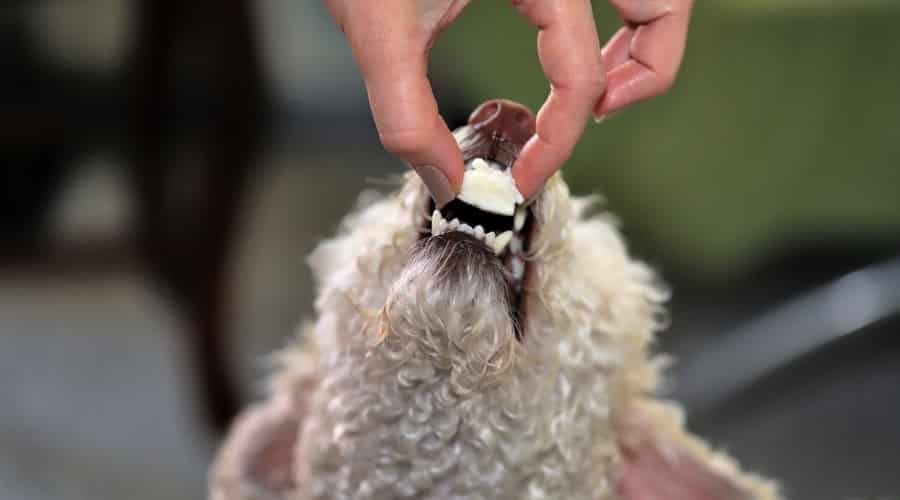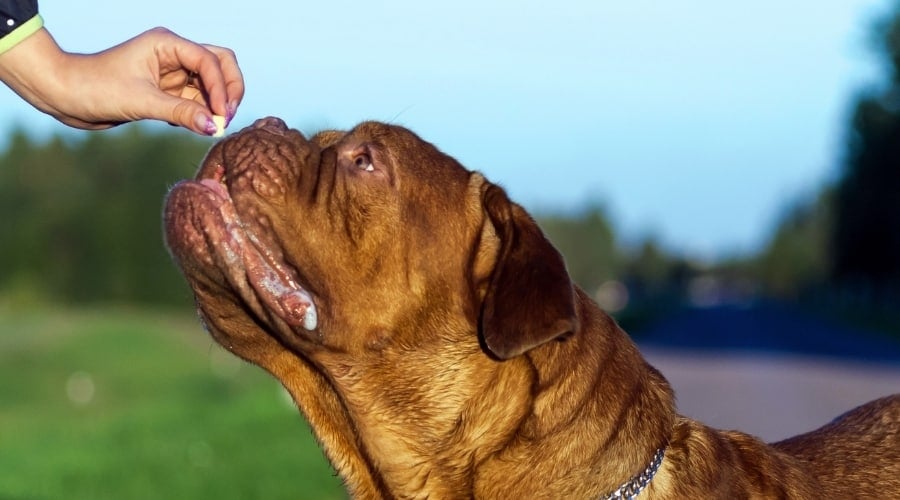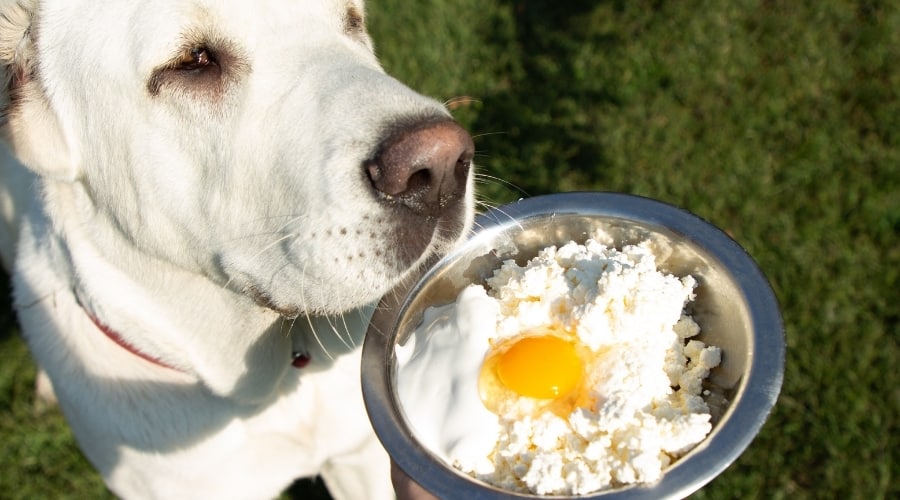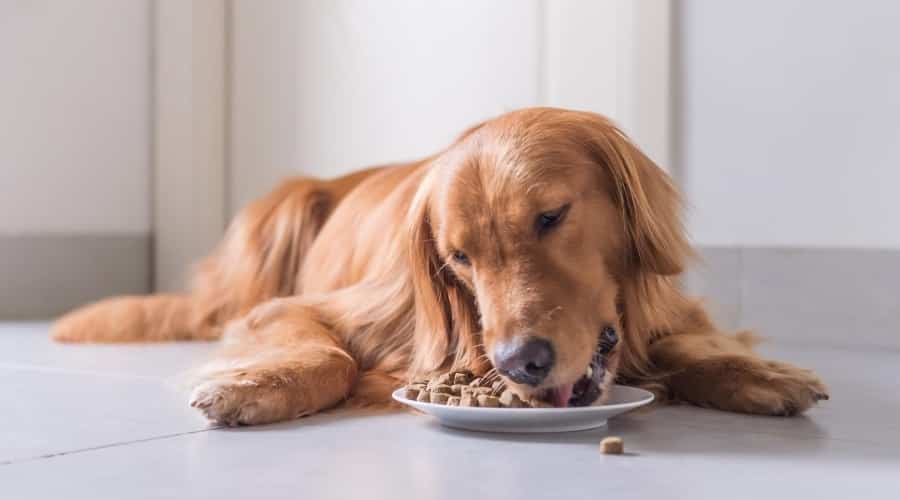Can Dogs Eat Cheese? Is Cheese Safe or Healthy For Dogs to Eat Regularly?
When you purchase through links on our site, we may earn a commission. Here’s how it works.
There’s no denying that dogs and humans alike have a great love affair with cheese. If your dog has stolen a chunk of it from the counter or has been enjoying it as an occasional treat from your plate, you’re probably wondering can dogs eat cheese? Is it safe for dogs?
Table of Contents
The good news is that, yes, in most cases, cheese is safe for our canine companions. But there are certain types that you’ll want to make sure Fido keeps his paws off of, as they could cause an upset stomach or other problems.
For humans, cheese contains important nutrients that can make it part of a healthy balanced diet. But before you go dishing up your pup a piece of cheese, you should understand how it’s digested, and any potential risks it may pose to your pup. Let’s take a deeper look!
Is Cheese OK For Dogs?
First and foremost, most cheeses will present little harm to our canine companions. Blue cheese is the type that can primarily cause dogs problems. There are a few others that may contain artificial ingredients that are also harmful, but these are usually not widely used.
Nutritional Benefits

Cheese is packed full of protein, calcium, vitamin A, essential fatty acids, and B vitamins, all of which are really good for us humans. But what is nutritionally beneficial for us, isn’t always so for our furry friends.
There are no published scientific studies to show any nutritional or health benefits of cheese for dogs, and they should be getting all the necessary nutrients from their usual diet. But that’s not to say that the occasional chunk of cheese or Goldfish cracker for our pups is a bad thing!
Some cheeses, such as those that have been fermented, contain probiotics or other friendly bacteria, which have been demonstrated in humans to have benefits for gut health. There is also a small amount of evidence for this in dogs, but our furry friends don’t actually need this additional gut support unless it has been suggested or prescribed by their veterinarian.
Dogs and Lactose Intolerance

Lactose is a sugar found in dairy products such as milk and cheese. Just as for certain humans, some dogs can’t digest lactose. This lactose intolerance can be mild or severe, and regularly feeding dairy to dogs can cause tummy upsets. This is because dogs don’t have enough of the enzyme required to break down lactose.
You will likely already know if your pup can’t tolerate dairy, but if you’ve not fed them cheese before, give just a small amount, keep a close eye on them, and look out for any upset tummy business.
Cheese and Medicine

Trying to get your dog to take their medication can be tricky. Nasty tasting tablets and liquids can be difficult to give, and dogs soon become wise to all our tricks! With cheese being so tasty and irresistible to our dogs, it can be a great foolproof method of getting them to take their meds! Slip the tablet into a small cube of cheddar and Fido should eat it no problem!
However, this is not the case when it comes to antibiotics. Antibiotics can bind to the calcium in cheese, meaning they may not be absorbed by the gut, making them less effective. Always check with your veterinarian first if it is OK to hide a particular medication in cheese.
Cheese as a Reward

Training your dog can be hard work and requires lots of rewards and positive reinforcement to encourage good behavior. Dogs go crazy for cheese, making it an ideal high-quality reward, especially for those trickier commands such as recall. Cheddar works best for this. It works well cut up into small cubes it’s easy to keep in your pocket and is safe for dogs to eat.
Sometimes dogs need a little distraction, such as when they’re left alone for a while. Lick mats and durable Kong toys are great for keeping your pup busy. A thin smearing of plain cream cheese can keep your pup occupied for ages.
Which Cheeses Are Safe For Dogs to Eat?

Most cheeses are safe for dogs to enjoy in moderation. Cheddar is often a great choice as it can easily be cut up into small pieces, while cottage cheese is typically lower in fat than many other kinds of cheese, might be the healthiest choice for your pet.
Cheeses safe for dogs:
- Cheddar
- Other hard cheeses
- Plain cream cheese
- Plain cottage cheese
- Feta and goat’s cheeses
- Mozzarella
Cheeses Dogs Shouldn’t Eat
While most cheeses are OK to give to your dog, there are a few to avoid as they could make them very ill. You may enjoy some of these cheeses as a human, but that doesn’t mean they are safe for your pup.
Blue Cheese

The fungus used in the making of blue cheeses can produce a substance called roquefortine C, which can be dangerous. If eaten, it can cause vomiting, diarrhea, fever, and seizures. The more blue cheese consumed, the higher the chances of developing these symptoms. If your pup has eaten blue cheese and displays any of these symptoms, contact your veterinarian straight away.
Cheese Containing Added Herbs or Flavoring

Onions, garlic, and chives are toxic to dogs. They also happen to be used quite often in some cheeses, such as cream cheese. So it is best to avoid feeding these to your pup. If your dog has eaten a cheese containing onion, garlic, or chives, contact your vet straight away.
Dairy-free Cheeses Containing Xylitol

Xylitol is a sugar substitute that can often be found in dairy-free products. It is highly toxic to dogs, so always check the ingredients of any vegan products before offering them to your dog. This ingredient is more common in certain candy than it is in cheese, but it’s still something you need to watch for. Other dangerous ingredients similar to xylitol include “birch sugar” and “birch sap.”
Is Cheese Bad For Dogs?
Which Dogs Can’t Eat Cheese?

There are some dogs who sadly, however much they drool when the cheese comes out, cannot eat it. It’s always best to speak to your veterinarian before introducing cheese as a regular part of your dog’s diet to ensure it would be safe for them.
Dogs suffering from chronic pancreatitis, or those who have had acute flare-ups of pancreatitis in the past, should not be fed cheese. Even just a small amount could be too much for their pancreas to handle and could make them very sick.
Dogs with kidney disease should also avoid cheese. This is because cheese is high in fat and salts, so when fed too often can cause high blood pressure, which could further damage the kidneys.
The same goes for dogs with sensitive stomachs. If your dog is prone to gut problems, or is fed a specific prescription diet, it is unlikely they will be able to tolerate cheese. Even if your pup doesn’t have a sensitive tummy, sometimes introducing a portion of new food can make them a little gassy or cause diarrhea. This may just be a side effect of the cheese, but if it continues for more than a few days, you will need to make an appointment to see your veterinarian.
How Much Cheese Can I Give My Dog?

As with everything, cheese is something to be enjoyed by your furry friend in moderation. Too much can actually be a bad thing. Although cheese can be a brilliant source of additional protein, vitamins, and minerals, it is also high in fat and calories. Your pet should be getting all the nutrients they need from balanced complete dog food. Special treats should only be a combined 10% of their daily calorie intake.
Too much cheese can cause weight gain and obesity. Obesity can lead to all sorts of other health problems such as diabetes. Regularly feeding your furry friend high-fat foods can also increase their chances of developing pancreatitis. This is a potentially serious condition where the pancreas becomes inflamed. Some breeds, such as Miniature Schnauzers and Cocker Spaniels, are particularly prone to this condition.
A small amount of cheese daily, or ideally every few days, is unlikely to cause any harm to most dogs. Make sure you give an amount of cheese suitable for the size of your pup. A Great Dane-sized portion would be rather a lot for a Chihuahua!
[accordion]
Final Thoughts
Yes, cheese can be fed to dogs in moderation, and most cheeses make a great tasty treat for your pup. But remember that it should make up a maximum of 10% of your dog’s daily food intake alongside their usual diet.
Some cheeses are best avoided, such as blue cheese, and some dogs that cannot eat cheese, such as those with lactose intolerance or pancreatitis. Cheese is especially useful for getting your pet to take their medication and as a high-quality reward for training.



